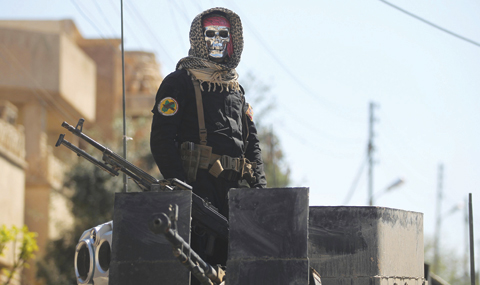Air strikes have reportedly killed large numbers of residents
 MOSUL: An Iraqi counter terrorism forces member stands guard in Mosul’s Al-Jadida area on March 26, 2017, following air strikes in which civilians have been reportedly killed during an ongoing offensive against the Islamic State (IS) group. — AFP
MOSUL: An Iraqi counter terrorism forces member stands guard in Mosul’s Al-Jadida area on March 26, 2017, following air strikes in which civilians have been reportedly killed during an ongoing offensive against the Islamic State (IS) group. — AFPBAGHDAD: Iraq has deployed snipers to target jihadists using civilians as human shields in Mosul, as it investigates air strikes that reportedly killed large numbers of residents in the city, the military said yesterday. Hundreds of thousands of civilians are still trapped in Mosul, caught between advancing Iraqi forces and the Islamic State group jihadists that they are fighting to defeat.
Iraqi officials and witnesses said that air strikes killed civilians in the Mosul al-Jadida area in recent days, but the number of victims-said to range from dozens to hundreds-could not be independently confirmed. IS "began to use citizens as human shields, and we are trying to target them with... snipers to eliminate them," Joint Operations Command spokesman Brigadier General Yahya Rasool told AFP. Iraqi forces are relying on "light and medium weapons, among them sniper (rifles), to hunt for Daesh members" located among civilians, he said.
However, Iraqi forces have also frequently fired mortar rounds and unguided rockets during the battle for west Mosul-weapons that pose a much greater risk to residents of areas where fighting is taking place. Rasool accused IS of gathering civilians together and then blowing up explosives-rigged vehicles nearby to make it look like "Iraqi forces... are targeting innocent civilians." He also said that Iraq has begun a probe into reports of civilians killed by air strikes in Mosul.
"The defense ministry opened an investigation into this issue," Rasool said. The US-led coalition against IS has indicated that it may have been responsible for at least some of the civilian deaths. "An initial review of strike data... indicates that, at the request of the Iraqi security forces, the coalition struck (IS) fighters and equipment, March 17, in west Mosul at the location corresponding to allegations of civilian casualties," it said in a statement on Saturday.
Mass displacement
At the beginning of this month the international alliance had said that "it is more likely than not, at least 220 civilians have been unintentionally killed by coalition strikes", while other incidents were still under investigation. Two witnesses who have since fled Mosul said that a building with around 170 people inside was destroyed.
One of them, Manhal Sumayr, said that IS snipers had fired on Iraqi forces in the area, after which an aircraft targeted them with a missile. An Iraqi brigadier general said that a total of 27 residential buildings had been hit by multiple days of strikes in west Mosul, and that three of them were completely destroyed. Bashar Al-Kiki, the head of the provincial council for Nineveh, of which Mosul is the capital, said that "dozens" of bodies were still buried under rubble in the city, while Governor Nawfal Hammadi put the toll at hundreds dead.
Other officials also said that hundreds of civilians had been killed. On Saturday, security forces did not permit journalists to reach the area where the strikes were said to have taken place. Following the raids, the United Nations called on parties to the conflict to do "everything possible" to protect civilians in Mosul.
"International humanitarian law is clear. Parties to the conflict-all parties-are obliged to do everything possible to protect civilians. This means that combatants cannot use people as human shields and cannot imperil lives through indiscriminate use of fire-power," said Lise Grande, the UN's humanitarian coordinator for Iraq. According to Iraqi authorities, more than 200,000 people have fled west Mosul since the operation to retake the area was launched on February 19. But the UN has said that around 600,000 are still present inside the city. - AFP










